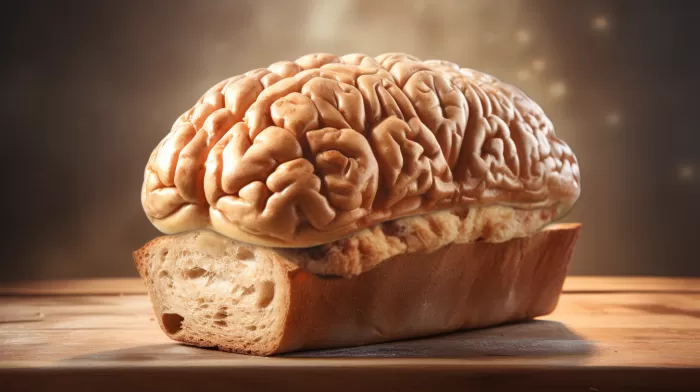The future of the American brain looks murky. One in 10 children reportedly suffers Attention Deficit Hyperactivity Disorder (ADHD), and millions are taking ADHD medication. At the same time, the memories of many older Americans have started to falter as they begin to experience the mind meltdown known as dementia. The possible common factor that may be driving a portion of this collective brain dysfunction: our boundless appetite for bread and other gluten-containing foods.
Grain Brain
It was once thought that if you experienced a reaction to gluten, a protein found in wheat, barley, and rye, the effect on your health stemmed from the resultant digestive difficulties. Experts believed that when your digestion suffered because of foods made with gluten-containing grain (pizza, cookies, bread, crackers, etc.), your brain, in turn, might be harmed because you weren’t absorbing the proper nutrients for brain health.
But scientists have now found that gluten can cause inflammation and damage in nerve and brain tissue without apparently instigating significant digestive issues. According to researchers who have analyzed studies of gluten reactions, often “… there is no clear relationship with nutrient deficiency and a precise mechanism for the neurological changes has not been defined.” In other words, after you eat a meal containing gluten, your immune system may begin to attack nerve and brain tissue without an observable reaction in the walls of the digestive tract.
Gluten and Attention Deficit
Because of these kinds of findings, more and more researchers are coming to believe that a first line of defense against brain problems may be a gluten-free diet. For instance, when European researchers examined 67 people with ADHD in Italy, they found that 15 percent of them had full-blown celiac, the autoimmune reaction to gluten. This is a significantly high rate since celiac is thought to occur in a little less than 1 percent of the general population. When they put these people, who ranged in age from 7 to 42 years, on a gluten-free diet they found that there was a “… significant improvement in their behavior and function compared to the period before celiac diagnosis and treatment…”
These results led to the experimenters’ conclusion that “… celiac disease should be included in the ADHD symptom checklist.”
Other common foods may also be adding to the ADHD problem. A study in the Netherlands and Belgium found that carefully controlling the diets of children with ADHD and eliminating problem foods improved the mental performance of two of three of the kids in the study. These researchers stress that parents should consult knowledgeable healthcare providers when limiting the foods children eat to make sure they receive adequate nutrition. But their research is further evidence that what kids eat is having a strong influence on their academic performance and behavior.
Prescription Ban
Another sign that something is seriously wrong with our brain health: Use of Adderall, an amphetamine ADHD medication, is so out of control that Duke University has banned its use “to enhance academic performance.” Meanwhile, the National Institute of Mental Health (NIMH) reports that 60 percent of children with ADHD are being treated with these types of medication.
Instead of figuring out natural ways to help kids with ADHD, American parents are medicating them. As Benedetto Vitiello, M.D., of NIMH points out, “Stimulant medications work well to control ADHD symptoms, but they are only one method of treatment for the condition.” Vitiello’s research has found that among American children from ages 6 to 18, about one in 20 is now on ADHD medication. Even some preschoolers are being given these drugs.
Many people find the fact that wheat, the simple grain contained in seemingly innocuous foods like toast, rolls, crackers, and pizza crust, can be wreaking havoc with so many people’s brains and nervous systems. If those who haven’t experienced their own brush with gluten-induced dementia might have trouble believing it, too. But you can go back decades and find that researchers have steadily compiled evidence that gluten can, in fact, make your immune system destroy your brain. For example, in 1991 scientists in Finland identified celiac patients who suffered “intellectual deterioration rang(ing) from moderate to severe and diffuse cerebral or cerebellar atrophy… found on brain CT.”
As those scientists admitted, “…the pathogenetic mechanisms are obscure…” But although we don’t understand how gluten performs its nefarious destruction we do know that these brain problems are growing in number and they threaten our future.



